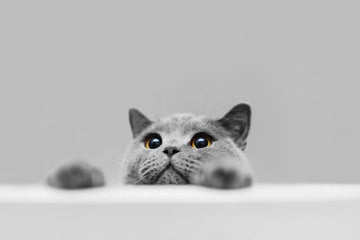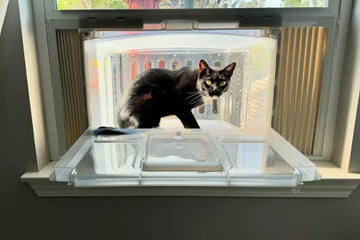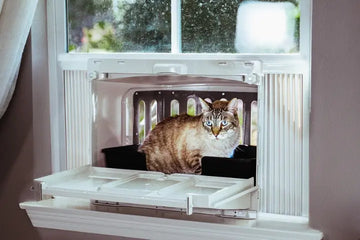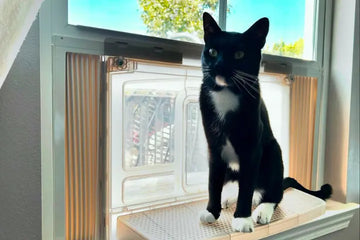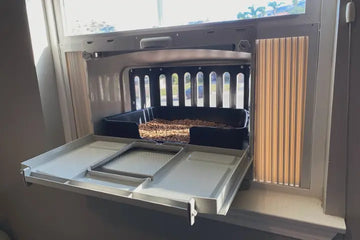How to Choose the Right Litter Box for Odor Control?
Choose a litter box with high sides and a lid to contain odors. Opt for antimicrobial coatings or carbon filters for extra odor control. Regularly clean the box and use clumping, odor-neutralizing litter. Consider size and ventilation of the area to ensure the box is appropriate for your space and cat.
Are Covered Litter Boxes Better for Reducing Odor?
Covered litter boxes can help contain odors, as they limit the spread of smell by trapping it inside. However, without regular cleaning, the confined space can concentrate the odor, making it more intense when opened. Proper ventilation and frequent cleaning are essential for effective odor control in covered boxes.
How Can I Effectively Reduce Cat Litter Odor?
To effectively reduce cat litter odor, clean the box daily, use clumping litter, and sprinkle baking soda for extra odor control. Choose a high-quality, odor-neutralizing litter, maintain proper litter depth, and replace it entirely every few weeks. Also, consider a litter box with a lid to contain smells.
What Are the Best Litter Types for Odor Control?
The best litter types for odor control are clumping clay litters with activated charcoal or baking soda, silica gel crystals, and natural biodegradable options like pine, corn, or walnut-based litters. These materials absorb moisture effectively and trap odors, keeping the litter box fresh for longer periods.
How Often Should I Change My Cat's Litter?
Change your cat's litter completely every two weeks and scoop out waste daily. If you're using clumping litter, you might only need to change it once a month, but still, maintain daily scooping. Adjust frequency based on odor control, the number of cats, and type of litter used.
Are There Any Home Remedies for Cat Litter Odor?
Yes, home remedies for cat litter odor include baking soda mixed into the litter for neutralization, regular scooping, and cleaning. Additionally, using activated charcoal or white vinegar near the litter box can help absorb and minimize unpleasant smells. Ensure proper ventilation to keep the area fresh.
What Role Does Diet Play in Cat Litter Odor?
Diet significantly influences cat litter odor as it affects the composition of a cat's waste. High-quality, digestible foods produce less pungent feces and urine. Conversely, diets high in fish or poor-quality ingredients can result in stronger, more offensive odors due to less efficient digestion and metabolism.
How Does Cat's Health Affect Litter Box Odor?
A cat's health significantly impacts litter box odor. Poor health can lead to infections or diseases, causing unusual or stronger urine and feces smells. Diets, hydration levels, and metabolic issues also affect waste odor. Promptly addressing health concerns can help maintain a more neutral-smelling litter box.
What's the Best Way to Clean a Litter Box?
Empty the litter box completely. Scrub with soap and warm water, avoiding harsh chemicals. Rinse thoroughly. Dry it before refilling with fresh litter. Clean daily by removing clumps and solid waste, and perform a deep clean weekly. Use gloves and wash hands afterwards to maintain hygiene.
How Often Should a Litter Box Be Replaced?
A litter box should be replaced once a year, but this can vary depending on its condition and the material it's made from. If it's cracked, worn, or retains odors despite cleaning, replace it sooner. High-quality, durable boxes may last longer, while cheaper ones might need more frequent replacement.
Can Baking Soda Help Eliminate Litter Odor?
Yes, baking soda can help eliminate litter odor. It neutralizes acidic and alkaline substances, reducing unpleasant smells. Sprinkle it on the bottom of the litter box before adding litter, and mix a little in to absorb and deodorize effectively without harming pets.
How to Prevent Litter Tracking and Odor Spread?
To prevent litter tracking, use a heavy, non-tracking litter and a litter mat. For odor control, choose a litter with activated charcoal or baking soda, clean the box regularly, and place it in a well-ventilated area. Consider a covered box and an air purifier nearby to further minimize odor spread.
Does Litter Depth Affect Odor Management?
Yes, litter depth significantly affects odor management. Deeper litter layers better absorb urine and feces, reducing ammonia volatilization and odor. However, excessive depth can hinder drying and promote bacterial growth, potentially increasing odor. Optimal depth balances moisture absorption and evaporation, effectively controlling odor emissions in litter management systems.
What's the Importance of Litter Box Location?
The litter box location is crucial for a cat's comfort and privacy, encouraging proper elimination habits. It should be in a quiet, accessible area, away from their food and water, to prevent stress and avoid accidents or behavioral issues. Proper placement ensures hygiene and maintains a harmonious living space for both cat and owner.
How to Train Cats for Better Litter Habits?
Start with a clean litter box in a quiet, accessible location. Use unscented, clumping litter. Show your cat the box and gently place them in it after meals and naps. Praise and treat for correct use. Clean regularly to maintain appeal. Never punish; instead, reinforce positive behavior with consistency and patience.
Should I Use Liners in My Cat's Litter Box?
Using liners in a cat's litter box is optional. They can make cleanup easier by lifting out waste and litter together. However, some cats dislike the texture and may tear them. If your cat accepts liners and they simplify maintenance for you, they're a convenient choice. Otherwise, they're unnecessary.
Can Air Purifiers Help With Cat Litter Smell?
Yes, air purifiers with activated carbon filters can help reduce cat litter smell by trapping odor-causing particles. However, they should complement regular litter box cleaning, not replace it. For best results, choose a purifier designed to handle pet odors and place it near the litter area.
What Health Issues Cause Increased Litter Smell?
Increased litter smell can be caused by health issues such as diabetes, kidney disease, or liver problems in pets. These conditions may lead to more concentrated urine or changes in feces. Infections, such as urinary tract infections, can also result in stronger odor due to bacteria and inflammation.
Is Clumping or Non-Clumping Litter Better for Odor?
Clumping litter is generally better for controlling odor as it allows for easy removal of waste, which contains the source of the smell. Non-clumping litter absorbs urine but may not prevent the spread of odor as effectively since the soiled litter remains mixed with the clean.
How Can I Dispose of Used Litter Without Smell?
To dispose of used litter without smell, seal it in biodegradable, odor-blocking bags before placing it in an outdoor trash can. Additionally, sprinkle baking soda in the bag to neutralize odors, and ensure the trash can has a tight-fitting lid to contain any residual scent. Dispose of regularly.



